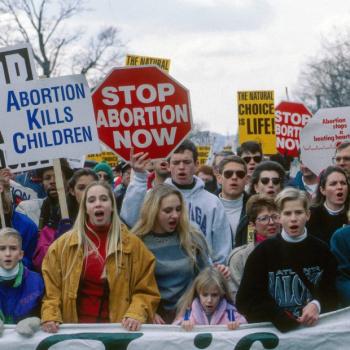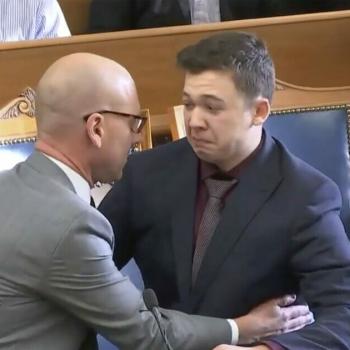
The Brett Kavanaugh circus is officially over. Our news and social media feeds can now gradually revert back to their usual levels of hysteria and toxicity—still high, but please God, not quite this high, thank you.
Yet even while life in 2018 returns to as close to normal as life in 2018 can be, the memory of these last few weeks will fester in the American mind for a long time to come. For ideologues on the left, Kavanaugh’s confirmation is the archetypal manifestation of power-hungry Man’s triumph against vulnerable, dispossessed Woman. It is the injustice to crown all injustices, they say. It is a damned spot on the American conscience which nothing will wash out, and in which all Americans who disagree with them are complicit. For who but a callous partisan hack could entertain the slightest doubt in any part of Christine Blasey Ford’s testimony? And who but an absolute monster could believe that even if Ford was wronged in the past, justice had been done in the present?
Me, for one. I hope and pray I am neither callous, nor partisan, nor a hack. You may read my own recent take on Kavanaugh’s confirmation and judge for yourself on that score.
Nevertheless, I do not share the vision of the anointed—not of Kavanaugh’s appointment, not of #MeToo as a whole, not of any fraught social controversy where the left has informed me there is only one decent place to stand.
This phrase, “vision of the anointed,” is the coinage of Thomas Sowell, whose book by that name was a seminal work in my high school civics education. Elsewhere, he has referred to it as the “unconstrained” vision. Against this anointed, or “unconstrained” vision of the left, he sets up the “constrained,” or tragic vision of the reasonable right. Contrary to the leftists’ caricature of conservative-thinking people, this tragic vision does not lead me to say unjust things never happen. On the contrary: It leads me to conclude that life is fraught with injustices, large and small. It leads me to conclude that, to quote everyone’s favorite psychologist, life is suffering, tainted by malevolence. At the same time, it leads me to conclude that not all injustices will be rectified in this life. A utopia of social justice is unattainable. Indeed, the harder we strive to achieve such a utopia, the more injustices are engendered.
I am not prepared to say that I know Christine Blasey Ford was lying or mistaken. From the beginning, I was open to the possibility that her account was both genuine and accurate. I remain open. I also put little stock in the fact that she’s declining to press further now that Kavanaugh is confirmed. It’s what I would do if I were her.
Likewise, when I scrolled through the many stories under the hashtag #WhyIDidn’tReport, I kept an open mind. I read what felt like authentic, psychologically believable accounts. When journalists like Kirsten Powers wrote at more length about their long-buried assault memories, those accounts also had the ring of truth (though their pertinence to the case at hand was another matter).
We have insufficient evidence to conclude that the young Brett Kavanaugh was a bad player. But it is a hard truth that men who are bad players will abuse women and get away with it if their victims cannot build a case that will stand up in court. When those women raise their hands decades after the fact to say “Me, too,” we can listen to their stories. We might even deem many or most of them credible. But it is one thing to listen sympathetically to a story. It is another thing to make it the basis for jurisprudential reform. (Yes, I am aware that Brett Kavanaugh was not on trial, but as we have been told with tedious relentlessness over the past few weeks, this is Not Just About Kavanaugh, so please, focus.)
To be sure, in some cases, there is a serial predator to be caught, and one voice can justly swell to a choir in the course of due process (see: Larry Nassar). In other cases, there will only ever be one victim and no witnesses. And if that one victim doesn’t seize her window of opportunity, she may have to live on with the knowledge that it is closed forever. This sounds harsh, yet it is a necessary consequence of holding two truths in balance: that bad men can hurt vulnerable women, and that malicious or mistaken women can hurt innocent men.
It’s true: Our justice system will not perfectly catch every perpetrator of injustice. But the moment we begin tilting towards the side of believing all allegations is the moment we risk toppling over the cliff’s edge into something far worse than imperfection. Pointing this out is not sociopathy. It’s sanity.
In the screed I linked at the beginning of the post, Jennifer Rubin connects the Republican Party’s blatant (to her) woman-hatred with its increasingly blatant (to her) immigrant-hatred. Ah! Another issue where Jennifer Rubin tells me to jump, and I’m supposed to ask how high.
She doesn’t mention it, but under the past couple weeks’ Kavanaughphony, a story broke in The New York Times reporting that roughly 1,600 migrant teenagers were being relocated to a Texas tent city in Tornillo due to overcrowding in child refugee facilities. In breaks between howling over Kavanaugh, leftist outlets have paused to make sure we don’t miss this “new horror” in “the already terrifying story” of Trump Torturing Refugee Kids. Never mind that CBS was forced to conclude while teens in the tent city stick to a strict regimen, they are well nourished, well exercised, and generally “doing well.” Among other atrocities, we are informed that the children are not receiving mandatory schooling during their temporary stay in the tent city. Teen boys playing soccer instead of doing Common Core algebra? The horror! What fresh hell is this?
Still, histrionic concentration camp analogies aside, conservatives can acknowledge that our immigration system is tangled, ponderous, and oversaturated. The initial decision to separate families was legally understandable, but it had complex and messy consequences, in the course of which innocent people may well have fallen through the cracks. Further delays are being caused by the addition of yet more bureaucratic red tape to child sponsorship procedures.
So where is a humane person to stand? Once again, the left has marked out the spot for us, and once again, the circle is drawn around themselves. Any reservations one might express, any suggestion that admission into this country is a privilege rather than a right, any hint of a suggestion that in some cases the parents of these children might bear some blame (as appeared to be the case with TIME’s last poster child), will mark you as the enemy of all that is decent and good.
Thus the tyranny of empathy rears its ugly head once more to announce the rules of the game: Whoever makes the greatest emotional display of pity when confronted with large-scale, multivariate problems wins, because emotion is now synonymous with moral virtue. But the question at hand is not who feels the most compassion for children, just as the question at hand in assessing #MeToo is not who feels the most compassion for women.
It was the same way with the Syrian toddler washed up on the shore. A single snapshot, like the snapshot of the crying little girl on TIME magazine. Our hearts went out, as anyone’s hearts naturally would. We feel compassion when children suffer or die in the tragic course of tragic events. This makes us not sociopaths. But does that make us right? Does that make us wise?
Bluntly, the evaluation and shaping of complex social policy is not a game of empathy one-upmanship. It is an endeavor in which feelings are no substitute for knowledge, and empathy is no substitute for wisdom.
I have touched on just two third-rail topics: #MeToo and Mexican immigration. I could name more: Islamic immigration, gun control, racial violence, disparate impact. The same pattern of leftist discourse holds across them all. Any stick will do with which to beat the conservative for his cardinal sin: believing that some stories have no happy endings, and that for some problems, trade-offs and compromises must suffice in the absence of solutions. And may I just say, since I’m writing as a Christian as well as a conservative, the only thing worse than a leftist is a Christian leftist. Self-congratulatory brow-beating is nauseating enough, but self-congratulatory brow-beating for Jesus, that just takes things to a whole new level.
For the millionth time: It’s not that Christians and conservatives don’t feel angry when we see injustice done. We do. It’s not that we don’t believe there are any villains. We do. It’s not even that we don’t believe there can ever be a legitimate call for systemic reform. When it comes to violent police overreach, David French does.
At the same time, we believe human nature, human structures and human institutions are complicated. We believe borders, literal and metaphorical, exist for a reason. We believe due process exists for a reason. We hesitate to ascribe to villainy what can be ascribed to error, incompetence, or the tragic vicissitudes of life.
Yet despite these fundamentally opposed paradigms, these radically disparate visions, there are conservatives willing in principle to extend their hand in good faith across the aisle. They are willing to have conversations. They are willing to work towards shared goals.
Or perhaps I should say, there were such conservatives. After the events of the past couple of weeks, there may be fewer than ever before. Can we really blame them?
We want to know what you think about the upcoming midterm elections. Vote in our poll below!













